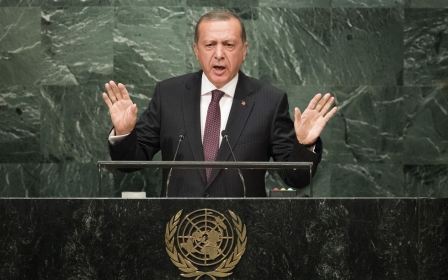Turkish nationalists signal support for shift to presidential system

ISTANBUL, Turkey – Turkey’s ruling party received a major boost in pushing forward with its long-held dream of a switch to an executive presidential system after receiving the backing of the leader of the country’s nationalist party.
Devlet Bahceli, the chairman of the Nationalist Movement Party (MHP), in a series of tweets on Thursday signalled his backing for a proposal put forward after meeting Prime Minister Binali Yildirim. He also called Yildirim’s proposal positive and reasonable.
Translation: I believe that our very productive meeting with Mr Yildirim will lead to welcome developments in favour of the country and nation.
Translation: Even if there is no concrete political agreement, I am hopeful that the process ahead will resolve the de facto imposition Turkey is under.
"God willing we will make a new constitution with the MHP. We will introduce a presidential system," said Yildirim on Friday.
Turkey’s current political system is a parliamentary one in which executive powers rest with the prime minister and his government. The Turkish president is considered to play more of a ceremonial role and is also expected to relinquish all political party affiliations after taking office.
Critics say President Recep Tayyip Erdogan, one of the founders of the ruling Justice and Development Party (AKP) who served as Turkey's prime minister from 2003 and 2014, has ignored and violated both provisos.
Erdogan’s camp say the president’s actions are fully within the scope of his authorities, especially since he is the first Turkish president to be elected by direct public vote.
These actions of Erdogan are the “de facto imposition” Bahceli referred to when signalling cooperation with the AKP.
The MHP’s support for the AKP proposal is crucial for the latter to get the 330 votes required in parliament to send the motion to a referendum.
The AKP has 317 MPs and the MHP has 40.
The MHP strongly opposed a shift to an executive presidency system before the failed coup attempt of 15 July.
But it has since become one of the AKP’s most ardent backers.
Political observers put this shift down to Bahceli’s attempts at once again becoming a relevant figure in Turkish politics.
The MHP was performing poorly in recent elections and had dropped even below the pro-Kurdish Peoples’ Democratic Party (HDP) in terms of the numbers of MPs in parliament.
Bahceli was also faced with a serious challenge to his own position as party chairman from influential figures within the party. He managed to put that down after the 15 July coup attempt.
Prime Minister Yildirim, who is considered one of Erdogan's most loyal allies, has also called on the secular and centre-left Republican People’s Party (CHP) to consider his party’s constitutional change proposal.
Dangerous road
Both the CHP and the HDP with 133 and 59 MPs respectively have strongly opposed any shift to a constitution that endorses an executive presidential system.
They, however, back work on a new constitution to replace the current one, written by the post-1980 coup regime, with a more democratic charter.
But they say an executive presidency system would only make Erdogan more authoritarian and lead the country down a dangerous road.
Erdogan was on Friday in Belarus for talks with President Alexander Lukashenko.
A statement on the Belarusian presidential website said: "The heads of state will discuss a wide range of issues regarding the development of interstate relations with an emphasis on the enhancement of the trade and economic cooperation, exchange opinions about the regional and international agenda."
Indications are that the AKP plans to put its proposals for a new system to a referendum in April or May next year. Erdogan and the AKP appear confident that the public will back an executive presidency after a surge in grassroots support from their traditional voter base following the botched coup attempt.
The MHP has insisted any constitutional change not touch the first four articles of the current constitution.
These state that the country is a social democratic secular republic founded on the principles of Mustafa Kemal Ataturk with Turkish as its official language.
Superpowered president?
Abdulkadir Selvi, a journalist at the Turkish Hurriyet newspaper and known for his close connections to the AKP, revealed details of the proposal that the MHP found acceptable.
According to Selvi, under the AKP's proposals, executive powers would pass to the president and the position of prime minister would be abolished, although the president would not have the authority to dissolve parliament.
The president would head the executive and appoint ministers who are not MPs. The president would also be able to issue decrees, equal in power to law, and have the power to veto any laws passed by parliament. An absolute majority vote would be required to pass the same law in parliament again.
Critics say such measures put too much power in the hands of one person with insufficient checks and balances. They say this will be to the detriment of democracy in Turkey.
Erdogan and the AKP have said that Turkey needs to switch to an executive presidency to be able to make quicker and more effective decisions without being impeded by parliamentary politics and bureaucratic hurdles.
Middle East Eye propose une couverture et une analyse indépendantes et incomparables du Moyen-Orient, de l’Afrique du Nord et d’autres régions du monde. Pour en savoir plus sur la reprise de ce contenu et les frais qui s’appliquent, veuillez remplir ce formulaire [en anglais]. Pour en savoir plus sur MEE, cliquez ici [en anglais].





